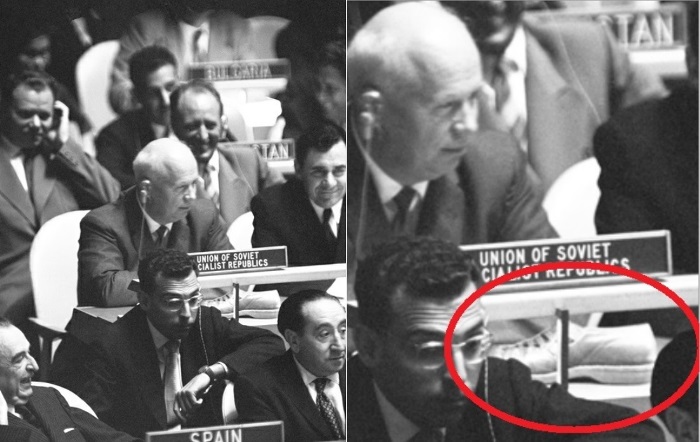|
gradenko_2000 posted:I just learned today that the "shoe-banging incident" with Khrushchev was fake news Mainly it's about Khruschev's turn of phrase https://en.wikipedia.org/wiki/Kuzma%27s_mother https://kulturologia.ru/blogs/121016/31753/ quote:As he was walking to his seat, someone stepped on his shoe and he lost it. One of the attendants/security officers brought it to him at his seat, but he couldn't manage to put it back on. He banged the shoe on the desk in front of him trying to get attention so that he could go up to the podium and object. He didn't have the shoe with him at the podium, and that was a photomontage. Yes he did bang the shoe, no he did not bang the shoe on the podium.
|
|
|
|

|
| # ? May 12, 2024 08:50 |
|
lol its almost enough to make you like khruschev
|
|
|
|
is it
|
|
|
|
what's up with Kuzma's mother
|
|
|
|
that's a nice looking shoe I see laces
|
|
|
|
https://www.youtube.com/watch?v=3A3TRFH6CR0&t=129s In this video anyway what he says is something like "An end, a grave for colonial slavery. The deeper it's buried the better." Also the shoe is supposed to be a sandal that he bought in New York, because he didn't bring any light footwear with him for warm weather.
|
|
|
|
my soft spot for khrush is all a result of corn, shoes, and steve buscemi
|
|
|
|
i don't know why he had to put all those lies in his speech but the space stuff was pretty cool
|
|
|
|
Ferrinus posted:i don't know why he had to put all those lies in his speech but the space stuff was pretty cool https://youtu.be/V9O94UTDAJQ
|
|
|
|
Ferrinus posted:i don't know why he had to put all those lies in his speech but the space stuff was pretty cool the virgin lands vs the chad mass starvation
|
|
|
|
what, you do like kruschev?
|
|
|
|
https://twitter.com/catalinarian1/status/1389371436222107648?s=19
|
|
|
|
without Googling let me guess: Mysterious Suicide?
|
|
|
|
Does anyone have any good resources on the treatment of anarchists in the USSR, especially the early years, ie Kronstadt and Makhno? I'm trying to brush up and make my interactions with anarchists more informed but for obvious reasons it's hard to find accounts more charitable than "the bolsheviks murdered anarchists by the thousands for purely ideological reasons". I'm not necessarily looking to refute these claims but I would like to educate myself.
|
|
|
|
these guys started a series on the history of east germany, could be good. part 1 starts with its political economy https://thetricontinental.org/studies-1-ddr/
|
|
|
|
Deified Data posted:Does anyone have any good resources on the treatment of anarchists in the USSR, especially the early years, ie Kronstadt and Makhno? I'm trying to brush up and make my interactions with anarchists more informed but for obvious reasons it's hard to find accounts more charitable than "the bolsheviks murdered anarchists by the thousands for purely ideological reasons". I'm not necessarily looking to refute these claims but I would like to educate myself. here's a source on kronstadt specifically https://www.marxists.org/archive/radek/1921/04/kronstadt.htm which makes it clear that uprising was a specific group rather than just being anarchists, generally, and that the sympathies of the city as a whole for the insurgent sailors specifically quickly shifted as it became clear who else supported the uprising
|
|
|
|
Ardennes posted:I would say a direct comparison between productive in Western Europe and Eastern Europe during the 1950s is ahistorical and not academically useful for very obvious reasons. Ardennes posted:Posting paper itself isn’t an argument. The issue is simply that Eastern European economies in many ways were simply not comparable to Western ones simply because of a vast gap in technology and investment. It isn’t an apples to apples comparison from the get go. quoting ardennes from d&d, didn't want to respond in any length in there because gently caress that forum but you might find the article on the ddr interesting in that regard mila kunis posted:these guys started a series on the history of east germany, could be good. part 1 starts with its political economy quote:At the end of the war, more than a quarter of all homes in East German cities had been destroyed or rendered uninhabitable by allied airstrikes. The use of infrastructure, and thus the supply of raw materials and food, was dramatically limited by the destruction of roads, railways and bridges. In addition, huge assets were taken to West Germany as company owners and senior employees of the former Nazi state fled to the Western zones in order to escape punishment or expropriation. quote:In the first eight years after the war, almost a third of all East German production was prevented from contributing to the country’s own economy as a result. Additionally, inequalities in industrial capacity that had been passed down from before the war only became greater with the division of Germany. Machine production for mining as well as steel foundries and mills were located in West Germany. In fact, the entire raw materials industry, including the coal and steel industry, was located there, leaving the Soviet Occupation Zone/DDR completely cut off from all of these resources. quote:Little by little, West Germany cut off the intra-German trade that was so important for the DDR. Even when individual companies still managed to conduct business with the DDR, West German authorities levied a variety of sanctions against them, and loans were withdrawn or special taxes were charged. However, most disruption tactics focused on sabotaging contracted delivery quotas and interrupting deliveries. These measures threw sand in the gears of intra-German trade, destroying the DDR’s only possibility for obtaining raw materials and durable equipment that their partners in Eastern Europe could not produce because of their own economic hardship. Moreover, West German companies traditionally manufactured products that were custom tailored to the needs of East Germany; only these companies were able to produce to the same standard of goods and offer duty-free deliveries of goods from nearby. There was no duty to pay because West Germany did not recognise the DDR as a state and therefore not as a foreign country either. In this way, West Germany’s exclusive mandate policy functioned as a lever of economic extortion. quote:With only seventeen million inhabitants, the DDR was a small country that could only compete in science and technology by partnering with experts internationally. However, the Cold War and embargo policy prevented them from participating in specialised and cooperative projects around the world. This is precisely what happened when the Coordinating Committee for Multilateral Export Controls (CoCom), led by the United States starting in 1949, blocked the export of Western technology into the Eastern Bloc. This prevented the East from having a part in technological advances and from hiring international labour in the fields of science, research, and development quote:West Germany developed guidelines in the mid-1950s through the Hallstein Doctrine to economically isolate and further weaken the DDR. Every official recognition and establishment of diplomatic relations with the DDR was to be understood as an ‘unfriendly act’. Any state that questioned West Germany’s exclusive right to the sovereign representation of Germany was threatened with a variety of economic and political sanctions and the breaking of diplomatic ties. The Hallstein Doctrine became a huge impediment to trade: DDR passports were not recognised; diplomatic relations, embassies, and trade and payment agreements were forbidden; and a restrictive licensing policy was imposed. quote:West Germany’s unchecked access to raw materials and assets from the war, combined with its refusal to make reparations payments, gave the country a fundamentally different economic starting point after the war. This structural advantage could be seen through the West’s decisive industrial locations, considerably lower reparation payments, and unhindered access to raw materials. In addition, the United States pumped capital into the Federal Republic, providing for a quick resuscitation of the economy and better conditions for the West German people. This inequality also led many people to emigrate from the East to the West. Fifty percent of those who left were young and highly qualified. In the 1950s alone, a third of all academics left the DDR. This was an enormous loss, as their education had been financed by the state they were leaving and they were urgently needed to rebuild the country everyone vastly underestimates the effect of the damage of ww2 and the subsequent cold war on the relative outcomes for communist and capitalist regions across the world to the point where i really wonder how much of the development of productive forces comes down to the system, and how much of it due to investment and your starting position. the soviets (and most of their eastern bloc friends) had been devastated by the war, losing millions of people in addition to infrastructure destruction. the USA had not suffered the same way, and was far richer than them to begin with, and was able to pour massive amounts of aid through the marshall plan, which the USSR could not. (the USSR also made the mistake of de industrializing east germany to begin with, pretty stupid but sort of understandable given what Germany had done to them). They then had to face economic blockade and were ringfenced in by the far more powerful and richer capitalist world. The PRC in 1979 was in a sorry state, some of it self inflicted, but mostly due to lacking capital and technological investment; they took off once western capital flooded the country - but was their gain *due* to liberalization, or was liberalization just a necessary ideological requirement of the west in order to provide capital?
|
|
|
|
The only modern war we had was pretty brutal to be fair. But the damage was limited to the already largely unmechanized south, so it's not like it did much against us in the long run. Plus we had a good almost hundred years to recover before WW2. But yeah the Kool aid drinkers never want to consider how impoverished and war-torn the Soviet states were after the war. They point to the shortages and famines and say ah, their foolish socialist system has done this, as if histories most horrific war hadn't just happened right there.
|
|
|
|
Actually it does make sense because it's the same logic they deploy against our own poor. Why didn't you just save money for college when you could afford groceries???
|
|
|
|
during the recent sherman derail in succzone i actually came across a paper that said georgia and south carolina didn't recover economically from the civil war until right before the great depression
|
|
|
|
mila kunis posted:everyone vastly underestimates the effect of the damage of ww2 and the subsequent cold war on the relative outcomes for communist and capitalist regions across the world to the point where i really wonder how much of the development of productive forces comes down to the system, and how much of it due to investment and your starting position. the soviets (and most of their eastern bloc friends) had been devastated by the war, losing millions of people in addition to infrastructure destruction. the USA had not suffered the same way, and was far richer than them to begin with, and was able to pour massive amounts of aid through the marshall plan, which the USSR could not. (the USSR also made the mistake of de industrializing east germany to begin with, pretty stupid but sort of understandable given what Germany had done to them). They then had to face economic blockade and were ringfenced in by the far more powerful and richer capitalist world. The PRC in 1979 was in a sorry state, some of it self inflicted, but mostly due to lacking capital and technological investment; they took off once western capital flooded the country - but was their gain *due* to liberalization, or was liberalization just a necessary ideological requirement of the west in order to provide capital? I would say it was absolutely the latter. It was never a fair fight, and the US clearly was guiding the situation to fit its own ideological version of how the world needed to be. If anything the Soviet Union/Eastern Bloc was doomed from the get-go. Krushchev thought he could wriggle his way out but it wasn't to be. It is also why Deng saw the way the winds were blowing in the late 1970s and made the best deal he could with the knowledge at some point that the US would come back to collect. (The US simply waited too long...due to its unbelievable hubris.) It is also why pretty much every strain of leftism (Anarchism/Left-Communism/Trotskyism/SocDems etc etc) that doesn't have a good answer to the situation will always be fundamentally a distraction. It is simply about power.
|
|
|
|
posadism has a pretty good answer, which I believe to be workable. we simply kill the capitalists with nuclear arms
|
|
|
|
I doubt aliens really have that much to gain dealing with humans and they have know it.
Ardennes fucked around with this message at 23:14 on May 10, 2021 |
|
|
|
posadism is just another kind of trotskyism, specifically denying the viability of socialism on one planet (USER WAS PUT ON PROBATION FOR THIS POST)
|
|
|
|
Ferrinus posted:posadism is just another kind of trotskyism, specifically denying the viability of socialism on one planet https://youtu.be/V9O94UTDAJQ
|
|
|
|
Ferrinus posted:posadism is just another kind of trotskyism, specifically denying the viability of socialism on one planet this is the only good post you have ever made posadas was right though
|
|
|
|
Ardennes posted:It is also why pretty much every strain of leftism (Anarchism/Left-Communism/Trotskyism/SocDems etc etc) that doesn't have a good answer to the situation will always be fundamentally a distraction. It is simply about power. Left-communism/Trotskyism understands the necessity of revolution and power whereas anarchists don't. I think Marxist-Leninists in here make the mistake of assuming that every strand of socialism that isn't their own is crypto-liberal/crypto-neocon ideology just because Marxism-Leninism "has happened," others "haven't happened," and its assumed that everyone who critiques it is a "privileged Western leftist." Honestly many M-Ls remind me of Democrats the way they gatekeep and accuse everyone who isn't them of being a privileged out of touch person who makes "the perfect the enemy of the good" and I say that even though I think M-Ls are great at exposing imperialist politics and even though I consider them my comrades rather than nefarious tankies or whatever The problem with Trotskyists is that they are obsessed with "permanent revolution" and are in love with the idea of the "democratic revolution," such that many supported the CIA funded rebellions in Ukraine and Syria because they thought they would precede the socialist revolution in the long run. I'm sympathetic with internationalism but so many are gullible idiots Left-communism is the ideology I'm most sympathetic to but because they're so cynical and believe that just about every action is useless and every political party/regime/union is really upholding the capitalist order, their only solution is to proselytize and pray that the working class will take power on its own. While I'm skeptical of vanguardism and feel like it made more sense in the rural context that USSR/China faced, I think left-coms just generally lack any assertiveness which is why they're made fun of for being armchair revolutionaries. Still, I like that they are steadfastly opposed to popular front politics and are the last people who would ally with liberals or be opportunists of any kind At the end of the day if you don't recognize that blood will have to be spilled for a revolution to happen, then you're probably a liberal regardless of how you identify, and if you don't think that taking power matters then you're a complete sucker. I like the idealism/end goals of anarchism but they put the cart before the horse and are really prone to this poo poo kind of thinking, because they engage in the same purity politics that liberals do Yossarian-22 fucked around with this message at 23:31 on May 10, 2021 |
|
|
|
Yossarian-22 posted:this is the only good post you have ever made i'm actually not joking, posadas was a trot to begin with eh, anarchists also believe in the necessity of revolution and in my experience their ultimate predictions and strategies are basically indistinguishable from those of leftcoms and of trots for that matter - since any specific organization is going to or has already betrayed the working class, what's necessary is to build consciousness so high and with such scope that basically the entire world revolts simultaneously and you just win through sheer weight of numbers. there's some dickering about the best way to build said consciousness maybe
|
|
|
|
don’t trots at least agree with the need to wield (some form of) state power to defend against counterrevolutionaries and direct productive forces in the short to medium term? I feel like that’s a significant difference between them and leftcoms/anarchists
|
|
|
|
not if it means socialism in one or a few countries. any seizure of state power within a particular set of borders is just the detonator for a chain of revolutions that spread across the globe. unlike anarchists and most leftcoms, trotskyists believe that the democratically centralist vanguard party is the surest way to prime and trigger such a detonator - and hell, i don't think they're wrong - but if you want to take and hold state power for the medium or long term for the purpose of socialist construction in a war of position rather than maneuver against the global bourgeoisie, well, that's a big no no
|
|
|
|
Basically, you have to have your foot always on the accelerator no matter what.
|
|
|
|
indigi posted:don’t trots at least agree with the need to wield (some form of) state power to defend against counterrevolutionaries and direct productive forces in the short to medium term? I feel like that’s a significant difference between them and leftcoms/anarchists leftcoms are absolutely for wielding state power. they just believe that public ownership isn't the same as common ownership and that workers need to steadfastly act "as a class" rather than "as a state" and spread the revolution as rapidly possible abroad in order to prevent its reversion to what they consider a replication of the bourgeois mode of production. ironically real trotskyists are actually more sympathetic to m-l regimes than they are (even trotsky himself still believed the ussr was an imperfect "workers' state under Stalin) they also hate democracy and generally criticize anarchists/antifa for being naive and making fascism a bigger boogeyman than capitalism. bordiga even wrote a piece called "revolutionary totalitarianism" to troll softer communists because he thought workers needed to exercise complete control in a revolutionary situation Yossarian-22 fucked around with this message at 01:32 on May 11, 2021 |
|
|
|
Yossarian-22 posted:workers need to steadfastly act "as a class" rather than "as a state" and spread the revolution as rapidly possible abroad in order to prevent its reversion to what they consider a replication of the bourgeois mode of production. oh that seems insane then. I don't see how the former would guarantee the latter but primarily idk how "immediately declare war on all existing nations" is a viable strategy for any state (or nationally-bounded class) let alone one that just went through a revolution
|
|
|
|
"act as a class rather than as a state" is basically word salad from the standpoint of marxist theory, which understands the state as the vehicle of the ruling class's domination of society. it's like asking someone to shoot with their hand rather than with a gun
|
|
|
|
indigi posted:oh that seems insane then. I don't see how the former would guarantee the latter but primarily idk how "immediately declare war on all existing nations" is a viable strategy for any state (or nationally-bounded class) let alone one that just went through a revolution it almost happened in wwi because workers all throughout Europe were united in just how pissed off they were at their leaders for sending them off to war, so "international solidarity with the workers of the world" was an extremely viable strategy in 1917-1921 which lenin pursued to some extent and which rosa luxemburg wanted to go even further with. bela kun took over hungary briefly and communist workers took over munich. leftcoms basically believe that the russian civil war and the failure of the munich revolution was the death knell for the actually necessary international socialist movement whereas trotskyists believe it was stalin's takeover of the country honestly posadas' idea that people will only be angry enough for a global socialist revolution after getting nuked has an eerie kind of accelerationist merit to it in that context, but i think it was also hard to spread a revolution from backwoods feudal russia to the rest of europe one whereas it might be easier in the entirely capitalist and highly technological world order that exists now
|
|
|
|
indigi posted:oh that seems insane then. I don't see how the former would guarantee the latter but primarily idk how "immediately declare war on all existing nations" is a viable strategy for any state (or nationally-bounded class) let alone one that just went through a revolution It was also why Lenin himself wasn't particularly enamored with the idea and the USSR was well on the track to "socialism in one country" before Stalin took ahold of the Central Committee since the alternative was constantly pushing into Poland/Iran etc until the Red Army ran out of men. Also, I don't really know for example how a left-communist would approach something like "trying to compete in international trade", do all the workers have to agree they are going to have to work longer hours so their country can get a trade surplus?
|
|
|
|
Ferrinus posted:"act as a class rather than as a state" is basically word salad from the standpoint of marxist theory, which understands the state as the vehicle of the ruling class's domination of society. it's like asking someone to shoot with their hand rather than with a gun it's sort of a matter of not letting the state subsume the class and constantly using the state while recognizing that it is the enemy. it is the have your cake and eat it too ideology of socialism, but i do think the "whithering away" of the state is sort of an ephemeral and abstract goal that marxists and revolutionaries have tried to unlock for generations so i think it's noble to work towards as long as it's not in service of western propaganda against nominally socialist regimes that have made progress with education, healthcare, etc. leftcoms and anarchists believe equally that the state is inherently antagonistic against workers, but anarchists believe a "workers' state" is undesirable whereas leftcoms believe it is desirable, but impossible because of the inherent nature of the state as an instrument of bourgeois rule, hence they want workers to run the state but also be constantly working for its own abolition???? they basically want to square a circle for better or worse i used to identify a lot with leftcom ideology and now i'm pretty agnostic about everything these days and i think strategy should be more adaptive than based on ideology imo Yossarian-22 fucked around with this message at 01:54 on May 11, 2021 |
|
|
|
Yossarian-22 posted:it's sort of a matter of not letting the state subsume the class and constantly using the state while recognizing that it is the enemy. it is the have your cake and eat it too ideology of socialism, but i do think the "whithering away" of the state is sort of an ephemeral and abstract goal that marxists and revolutionaries have tried to unlock for generations all of this poo poo just sounds like people dreaming with their dumbass theorized takes on how they'd do it perfectly with zero actual historical materialism. none of these people demonstrate practical examples of what they'd do in the face of organized pressure and murder aimed at their rear end year after year without turning into something like stalin or deng. some guy who was critiquing some shithead chinese ultraleftist's bitchfest about the prc/state capitalism (incredibly aimed at *pre-dengist* china)/blah blah put it pretty well (http://www.unityandstruggle.org/2013/12/some-remarks-on-bloom-and-contend-a-critique-of-maoism/): "So: rapid improvement of living standards was necessarily a paramount task of the Chinese revolution. But this could only be achieved in a revolutionary way if the Chinese revolution was part of or accompanied by a broader revolution that included advanced capitalist zones. Yet such a broader revolution was nowhere in the offing. Therefore Chinese revolutionaries should have…. What? What’s lacking in this, here and throughout, is a sense of the Chinese revolution and Maoism as part of our history, along with the Paris Commune (another failure dominated by incorrect assumptions), the Russian revolution, the revolutions and rebellions in the third world, the black liberation movement in this country, etc., etc. These are, have been, great movements and reaches toward human emancipation and even communism – all defeated, all of them failures, yes, often beset by weaknesses and blunderings and incorrectnesses, so many blind alleys as we can see at this point – but if this history of defects and failures is all that we can see, then we might as well give it up. How we treat this history is important. In Bloom and Contend (which is not the worst offender in this regard, by any means) there’s often the suggestion or implication that “the correct line,” the obviously revolutionary path, was always available, there for the taking."
|
|
|
|
lotta what i feel are mischaracterizations here but whatever, its not really important. more important imo is to stop treating "tendencies" as a thing, the way they are discussed online is and itt is almost totally divorced from the actual political situation as it exists now. SA and SEP (the WSWS people) are both technically trotskyists, but to compare the two organizations as being similar in almost any concrete way is absurd. look at all the different caucuses in dsa, many of them can be lumped together or pitted as against each other ideologically but then support and follow through on the exact same political program. CPN are generously social democrats, some of their leading members work as campaign staffers for democratic politicians, some of whom arent even supported or endorsed by local DSA chapters, bread and roses call themselves marxists though people will argue that theyre trotskyists or social democrats, etc. emerge in NYC talks about communism and from what I know could maybe be seen as what most people would describe as MLs, but all of them together fundamentally agree about the way DSA operates currently within the democratic party, theres no disagreement between them on the issue. those are just examples, theres plenty more, but its pretty divorced from any actual struggle to try to debate these nebulous ideas and reduce stuff down to "trots want the revolution to go on forever and dont believe in wielding state power" when there are clear historical examples but more importantly recent and current examples that demonstrate thats not true. the labels are often just a form of identity that people want to latch on to and generally speaking, if im talking with someone and they want to talk about tendencies and whats this one or that one and what are you thats usually a red flag (the bad kind) that theyre not really interested in being a serious political actor. not always, but often its the case. basically political discussion has to be rooted in the actual political debates that are relevant to the class struggle as it exists and the formations engaged in those debates and actions currently. much more productive and clarifying when thats done.
|
|
|
|

|
| # ? May 12, 2024 08:50 |
|
The problem is you could simply argue that the concept of a state is simply sometime of concentrated power, and that you get into a fundamental dilemma when you try to "destroy power" with "power." You could argue that Marx's idea of a "withering of the state" under communism is that power would be perfectly decentralized. (personally I don't know if I am much of a communist because I don't think power can ever be destroyed or perfectly decentralized unless humans themselves completely change... but at the same time I can clearly defend aspects of Marxian economics). Otherwise, there is building socialism itself, which is to me more closely collected with material reality and is debatable. The problem is I don't think left-communism/anarchism really has the concepts that make that possible because building socialism is going to require not just concentrated power but heavily concentrated and organization because it is attempting to upend a hegemonic economic/geopolitical system. Trotskyism has some of the building blocks but it is so burdened by its own baggage and unworkable ideas that it doesn't really matter. Posadism is a branch of Trorskyism that simply hopes aliens will do the heavy lifting to make the whole thing work. Then you got social democracy/democratic socialism which ... well liberalism.
|
|
|
















